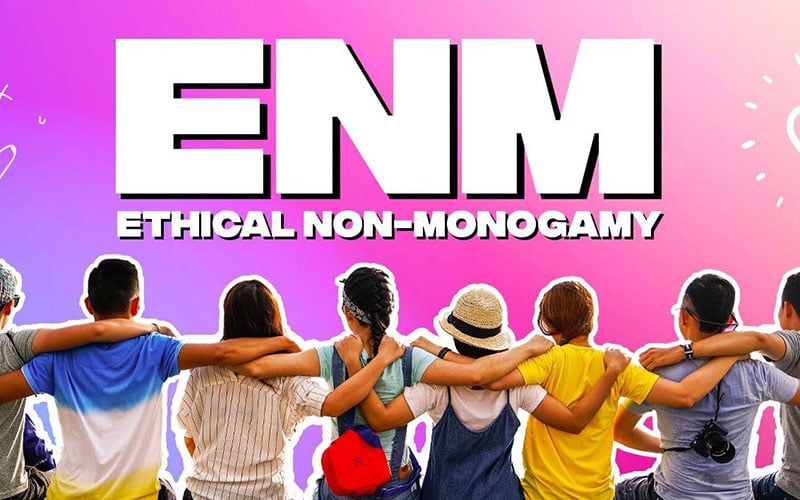
In recent years, enm relationship have evolved beyond the traditional monogamous structure. People are exploring alternative ways of connecting with others, and one such approach is emotional non-monogamy (ENM) relationships. ENM relationships offer individuals the opportunity to have multiple emotional connections while maintaining open and honest communication. This comprehensive guide aims to shed light on the concept of ENM relationships, provide insights into its dynamics, and offer practical advice on navigating this unique style of relating.
Ethical non-monogamy relationship, often referred to as ENM, is a relationship style that acknowledges and permits multiple partners or connections while emphasizing open communication, consent, and respect for all parties involved. Unlike cheating or infidelity, which involve secrecy and betrayal, ethical non-monogamy is rooted in honesty, transparency, and the mutual understanding that all partners are aware and consenting to the arrangement.
Ethical non-monogamy encompasses various relationship styles, each with its own unique dynamics and guidelines. Here are some of the common forms of ethical non-monogamy:
In an open relationship, partners agree to engage in sexual relationships outside of their primary partnership. This allows individuals to explore connections and experiences with others while maintaining their commitment to their primary partner.
Polyamory involves having multiple emotional and romantic relationships simultaneously, with the consent and knowledge of all involved parties. Unlike open relationships, polyamory focuses on developing deep emotional connections with multiple partners.
Swinging refers to engaging in consensual sexual activities with others as a couple. It typically involves attending parties or events where couples can interact and explore their sexuality with the consent and participation of their partner.
Relationship anarchy challenges the traditional hierarchical structures of relationships. It emphasizes personal autonomy and rejects predefined roles and expectations. In relationship anarchy, each connection is unique and evolves organically based on the desires and needs of the individuals involved.
ENM offers a range of benefits for individuals and couples who choose to embrace this relationship style. Here are some of the key advantages:
Ethical non-monogamy necessitates open and honest communication among all parties involved. This level of transparency fosters a culture of trust, vulnerability, and emotional growth, allowing individuals to express their desires, needs, and boundaries freely.
By engaging in multiple relationships, ethical non-monogamy allows individuals to explore diverse emotional connections. This can lead to personal growth, increased self-awareness, and a deeper understanding of one’s own desires and capacity for love.
Ethical non-monogamy encourages individuals to explore their sexuality and desires in a consensual and responsible manner. It provides opportunities for personal growth, sexual exploration, and the discovery of new experiences.
In ethical non-monogamy relationships, partners have the opportunity to support each other’s personal and emotional growth. By sharing experiences and insights gained from other relationships, individuals can learn from one another and build a stronger foundation for their primary partnership.
Ethical non-monogamy offers an alternative to the societal expectations and pressures of monogamy. It allows individuals to create relationship structures that align with their authentic selves, freeing them from the constraints of traditional norms.
While ethical non-monogamy can be fulfilling and transformative, it is not without its challenges. Here are some common obstacles that individuals may encounter:
Navigating multiple relationships can trigger feelings of jealousy and insecurity. It requires individuals to address these emotions openly, communicate their needs, and develop strategies to manage and overcome them.
Balancing multiple relationships can be demanding, particularly when considering work, family, and other commitments. Effective time management and prioritization become essential skills to ensure all parties involved feel valued and respected.
Ethical non-monogamy is still widely misunderstood and stigmatized in many societies. Individuals in non-monogamous relationships may face judgment, discrimination, and challenges when disclosing their relationship structure to others.
With multiple emotional connections, individuals may find themselves navigating complex dynamics, including managing differing expectations, needs, and levels of emotional involvement. It requires a high degree of emotional intelligence and empathy to navigate these complexities successfully.
Ethical non-monogamy often requires individuals to prioritize self-reflection and introspection. Maintaining a strong sense of personal identity while engaging in multiple relationships can be a challenge, requiring continuous self-exploration and boundary-setting.
A1: Finding the right relationship structure is a deeply personal journey. If you’re curious about ENM, start by exploring your desires, values, and expectations. Engage in open conversations with your partner(s) and seek resources, such as books, podcasts, and online communities, to gain insights and guidance.
A2: No, ENM is distinct from cheating. Cheating involves breaking the agreed-upon rules and boundaries of a relationship, while ethical non-monogamy is based on open communication, consent, and honesty among all parties involved.
A3: Absolutely! ENM relationships can be as committed and enduring as monogamous relationships. The key lies in establishing clear boundaries, effective communication, and mutual trust among all partners.
A4: Jealousy is a natural emotion that can arise in any relationship. In ethical non-monogamy, it is essential to acknowledge and address jealousy openly and honestly. Engage in compassionate communication with your partner(s), practice self-reflection, and consider seeking support from therapists or relationship coaches who specialize in non-monogamous dynamics.
A5: There are various resources available to individuals interested in ethical non-monogamy. Books such as “The Ethical Slut” by Dossie Easton and Janet W. Hardy, online communities like Reddit’s r/polyamory, and local support groups offer valuable insights, advice, and a sense of community for those exploring ethical non-monogamy.
A6: Ethical non-monogamy is not a one-size-fits-all approach. It requires a high level of self-awarenessto determine if it aligns with your values, desires, and relationship goals. It’s important to remember that ethical non-monogamy is a consensual choice and may not be suitable for everyone.
Ethical non-monogamy (ENM) relationships offer an alternative to traditional monogamy, emphasizing open communication, consent, and honesty. By embracing ethical non-monogamy, individuals can explore diverse emotional and romantic connections, foster personal growth, and challenge societal norms. While it comes with its unique set of challenges, ethical non-monogamy provides opportunities for self-discovery, increased intimacy, and mutual support. Remember, the key to successful ethical non-monogamy lies in open communication, empathy, and a commitment to personal growth and self-reflection.
Recommended other topics: What is Artificial Selection-Power of Human Influence










© InfoDoot. All Rights Reserved.